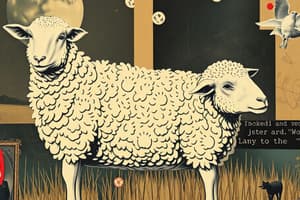Podcast
Questions and Answers
What event marks the shift from domestic bliss to crisis in Mary and Patrick's relationship?
What event marks the shift from domestic bliss to crisis in Mary and Patrick's relationship?
- Mary's decision to cook dinner.
- Patrick's revelation that he wants to end their marriage. (correct)
- Mary's emotional breakdown.
- Patrick's dismissal of Mary's dinner suggestions.
How does Mary Maloney respond after murdering her husband?
How does Mary Maloney respond after murdering her husband?
- She seeks help from friends.
- She confesses her crime to the police.
- She feigns innocence and prepares the lamb. (correct)
- She immediately flees the scene.
What item does Mary use to murder Patrick?
What item does Mary use to murder Patrick?
- A knife.
- A kitchen utensil.
- A heavy book.
- A frozen leg of lamb. (correct)
What theme is prominently explored through Mary’s actions after the murder?
What theme is prominently explored through Mary’s actions after the murder?
How do the detectives react when they arrive at the scene of the crime?
How do the detectives react when they arrive at the scene of the crime?
What psychological transformation does Mary undergo after the murder?
What psychological transformation does Mary undergo after the murder?
What does Patrick exhibit upon his return home, contrasting with Mary’s preparations?
What does Patrick exhibit upon his return home, contrasting with Mary’s preparations?
What is the ultimate irony present at the end of the story?
What is the ultimate irony present at the end of the story?
Flashcards are hidden until you start studying
Study Notes
Setting and Characters
- Mary Maloney, pregnant and devoted wife, awaits her husband Patrick's return from work in a warm, inviting home.
- The atmosphere is cozy, with drinks prepared; her tranquility contrasts with her husband's unannounced tension.
- Patrick Maloney, a police officer, enters, displaying signs of fatigue and despondency.
Plot Development
- As the couple settles down, Mary tries to engage Patrick in conversation, suggesting dinner options; he dismisses her offers, creating an underlying tension.
- Patrick reveals he wants to end their marriage, shocking Mary; this moment marks a shift from domestic bliss to crisis.
- In a moment of uncontrollable emotion, Mary murders Patrick by striking him with a frozen leg of lamb.
Reaction and Cover-Up
- Following the murder, Mary enters a calculating state; she decides to cook the lamb to cover her tracks and appear innocent.
- She interacts with the grocer, Sam, maintaining her facade of a cheerful wife preparing dinner, showcasing her ability to manipulate appearances.
- Mary rehearses her response to return home, ensuring her actions seem normal, reflecting her psychological transformation from shock to determination.
Investigation and Irony
- After discovering Patrick's body, Mary performs convincingly during police investigations; she feigns distress and provides a plausible alibi.
- The detectives, including Jack Noonan, are completely unaware that they are consuming the evidence (the leg of lamb) which could link Mary to the crime.
- The story ends with an ironic twist: the detectives discuss the murder weapon being likely hidden "under their very noses," while they unknowingly eat it.
Themes and Motifs
- The duality of appearance vs. reality highlights how Mary manages her public persona as a loving wife while concealing her crime.
- The story explores themes of betrayal, domestic life, and the extremes of human emotion when faced with loss.
- Irony plays a crucial role, particularly in how the investigation unravels amidst the very meal Mary serves to the detectives.
Conclusion
- "Lamb to the Slaughter" portrays a gripping narrative about domesticity transforming into violence, emphasizing manipulation, psychological resilience, and the risks of underestimating those we think we know.
Setting and Characters
- Mary Maloney is a pregnant, devoted wife, eagerly awaiting her husband Patrick's return in a comforting, warm environment.
- The cozy atmosphere with prepared drinks contrasts with Patrick's tension upon arrival, hinting at upcoming conflict.
- Patrick Maloney, a weary police officer, embodies fatigue and despair, setting a somber tone for the unfolding events.
Plot Development
- Initial domestic interactions reveal underlying tension; Mary attempts to engage Patrick, but he dismisses her efforts, escalating discomfort.
- Patrick’s shocking announcement to end their marriage drastically shifts the narrative from domestic harmony to emotional crisis.
- In a moment of emotional turmoil, Mary resorts to murder by striking Patrick with a frozen leg of lamb, marking a pivotal moment in the story.
Reaction and Cover-Up
- Post-murder, Mary enters a calculated mindset, choosing to cook the lamb to conceal her crime and maintain an innocent appearance.
- Her interaction with the grocer, Sam, showcases her manipulation of social expectations, appearing as a cheerful wife preparing dinner.
- Mary carefully rehearses her return home, reflecting a shift from initial shock to a determined effort to hide her actions.
Investigation and Irony
- During the subsequent investigation, Mary plays the role of a distraught wife convincingly, providing a solid alibi while slipping past detectives.
- Detectives, including Jack Noonan, unknowingly consume the leg of lamb—the very evidence that connects Mary to the crime, enhancing the story's irony.
- The narrative concludes with the detectives speculating about the murder weapon hidden "under their very noses," underlining the story's ironic twist.
Themes and Motifs
- The disparity between appearance and reality drives the narrative, illustrating how Mary maintains her public image while hiding her crime.
- Major themes include betrayal, the complexities of domestic life, and the extremes of human emotion in response to loss.
- Irony plays a critical role, especially in the detectives’ obliviousness while engaging with the evidence at the heart of the murder case.
Conclusion
- "Lamb to the Slaughter" presents a gripping transformation of domesticity into violence, highlighting themes of manipulation, psychological resilience, and the dangers of underestimating those around us.
Studying That Suits You
Use AI to generate personalized quizzes and flashcards to suit your learning preferences.




